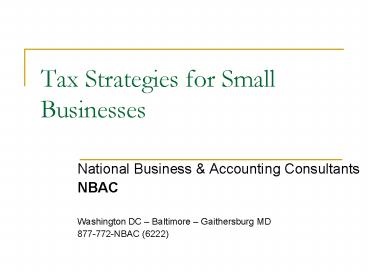Tax Strategies for Small Businesses - PowerPoint PPT Presentation
1 / 17
Title:
Tax Strategies for Small Businesses
Description:
Food donations. Book donations. Other inventory donations. Scientific and/or ... Deduct auto expense standard mileage deduction or actual expense deduction ... – PowerPoint PPT presentation
Number of Views:60
Avg rating:3.0/5.0
Title: Tax Strategies for Small Businesses
1
Tax Strategies for Small Businesses
- National Business Accounting Consultants
- NBAC
- Washington DC Baltimore Gaithersburg MD
- 877-772-NBAC (6222)
2
Accounting side of a business cycle
Becoming a partner
Selling a business
3
Choosing the right entity type
- Sole Proprietorship (self-employment tax)
- Partnership (pass-through entity)
- LLC
- C Corporation (double taxation)
- S Corporation (pass-through entity)
4
Tax considerations for evaluating choice of
entity (Sole Proprietor -LLC-Corp-S Corp)
- Formation consequences
- Tax rates
- Income distributions
- Payroll tax implications
- Problems with losses
- Fiscal year
- Fringe benefits
- Transferability
5
Understand business expenses
- Understand deductible expense, most expenses
fully deductible, some half deductible (meal and
entertainment), some non-deductible (federal tax
payment, penalty) - Some easily overlooked business expenses
business gifts, dues and subscriptions, catering,
casual labor and tips, travel, parking and
meters, credit card interest, etc.
6
Minimizing taxes through charitable giving
- Ordinary income property
- Food donations
- Book donations
- Other inventory donations
- Scientific and/or computer equipment
- Assembled by the taxpayer
7
Strategy during the year
- Keep records of business expenses
- Track depreciation of tangible property and
amortization of non-tangible property - Consider home office
- Transportation
- Pay yourself through employee benefit program
- Control your payroll expenses
8
Keep records of business expenses
- Always collect receipts of business-related
activities. - Always keep company bank statements, check
copies, and credit card statements. - Do bookkeeping and reconciliation timely
9
Depreciation of tangible property and
amortization of non-tangible property
- Depreciation of equipment, vehicle, computer,
etc. - Amortization of business start-up costs,
goodwill, etc. - Elect Section 179 deduction expense, instead of
depreciate, tangible property up to 125K
10
Home Office
- Deduct home office expenses if using part
of home for your business, including part of
mortgage, real estate tax, utilities, insurance,
security, HOA, home depreciation, home
improvements and repairs.
11
Transportation expenses
- Deduct auto expense standard mileage
deduction or actual expense deduction (insurance,
loan interest, repairs, maintenance, gas, other) - mileage expenses deduction
- 07 48.5 cents/mile
- 08 50.5 cents/mile
- Employers may provide workers with
- up to 115 per month in tax-free
- transit and vanpool benefits 220
- in qualified parking in 2008
12
Employee Benefits
- Variety of retirement programs with different
limits, eligibility requirements and levels of
exclusivity - Insurance programs including health, life,
disability and long-term care with a range of tax
benefits - Section 125
- Targeted executive
- programs
13
Payroll taxes
- If employees, employer pays employment taxes,
including SS tax, Medicare tax, FUTA and SUTA tax - If contractors, contractors pay self-employment
taxes - Accurately determine employee or contractor based
on IRS rule
14
Pay yourself first
- Between Social Security/Medicare, Federal and
State income taxes, retirement plan contributions
save up to 50 in taxes - Utilizing self-employed spouse strategy
- Unique benefits of Section 125 plans
- Hire your children
15
Lease-back strategies
- Fully depreciated property may be sold to the
business owner and leased back to the business - The seller attains a lump sum of cash quickly and
the buyer acquires a lower than market value
purchase price, along with a long-term lease at a
premium rate. - Buyer derives tax benefits from the arrangement,
such as being credited for depreciation of the
property
16
Get professional help from experts
- A chain is no stronger than its weakest link
- Natalie Berman, CPA
- Jie Chen, CPA
- Boris Foxman, RFC (employee benefits
- financial
planning)
17
Footnote
- Looking for accounting and financial planning
professionals with or without established
practices within all ethnic groups































